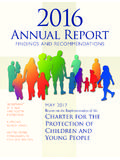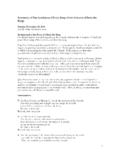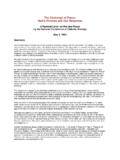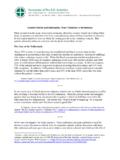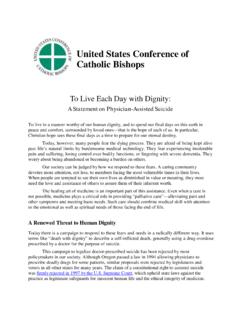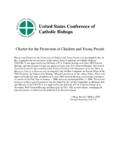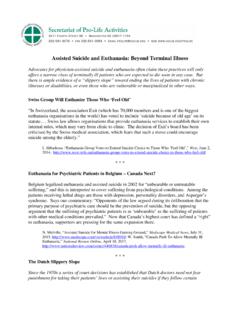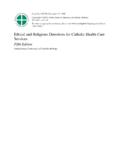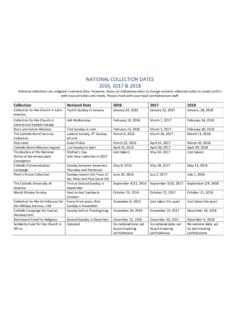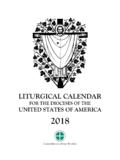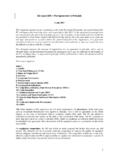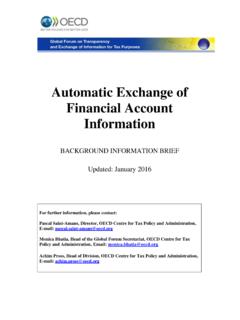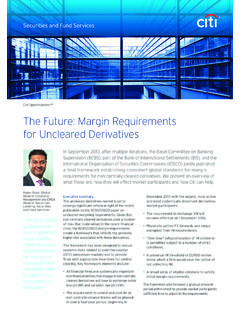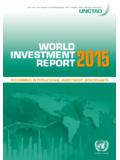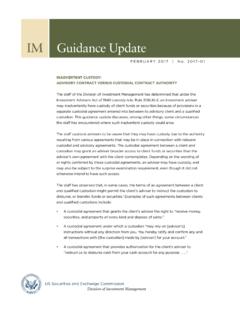Transcription of Roman Catholic - Reformed Dialogue
1 1 These Living Waters: Common Agreement on Mutual Recognition of Baptism A Report of the Catholic Reformed Dialogue in United States 2003 - 2007 Table of Contents 1. Introduction 2. Common Agreement on Mutual Recognition of Baptism 3. Historical overview: sacraments and sacramentality a. Sacramentality i. Roman Catholic view ii. Reformed view b. Sacraments i. Roman Catholic view ii. Reformed view c. Summary 4. Baptismal rites a. Our Common Early History b. Historical Developments: The Reformation c. Historical Developments: Roman Catholic d. [comparative chart of pre and post-Tridentine Baptismal Rites appendix?] e. Development of Baptismal Rite after the Reformation i.
2 Reformed ii. Roman Catholic f. Twentieth Century Convergence in Scholarship and Ritual i. Reformed ii. Roman Catholic g. Critical Comparison of Roman Catholic and Reformed Rites h. Conclusion: Similar Rites with Different Hermeneutics 5. Theology of Baptism: Roman Catholic , Reformed , and Common Perspectives a. What is baptism? b. Why does the church baptize? c. What does Baptism effect or signify? d. How is Christian Baptism related to the Biblical Economy of Salvation? e. What is the Relationship between Baptism, Faith and Discipleship? f. What implications does Baptism have for the church? g. Who may baptize and with what means and Formula ? h. Why do people need to be baptized?
3 I. Who can receive baptism? j. Why do we baptize children? k. Why should someone be baptized only once? l. What is the relationship between baptism and confirmation and/or profession of faith? m. What is the relationship between baptism and election? n. What is the relationship between baptism and grace? 2 o. What is the relationship between baptism and sanctification? p. What is the relationship between baptism and the assurance of salvation? 6. Pastoral Recommendations: Tangible Expressions of our Mutual Recognition of Baptism 7. Endnotes 8. Resources 9. Appendices a. Notes on the Comparison of Rites for Paedo-Baptism in the PC(USA), UCC, RCA, RC and CRCNA texts 1. Introduction A SEASON OF ENGAGEMENT The 20th century was one of intense Dialogue among churches throughout the world.
4 In the mission field and in local communities, in regional ecumenical bodies and in bilateral discussions between churches, Christians made commitments to engage each other not only in cooperative activity but theological deliberation. The Roman Catholic Church and churches of the Reformed tradition have been no exceptions. This report on baptism is offered in the context of more than forty years of Dialogue between the Reformed churches in the United States and the National Conference of Catholic Bishops (now the United States Conference of Catholic Bishops). The relationships in the United States form only a part of our context, however, and our Dialogue has been enriched by encounter and relationships around the world.
5 OUR GLOBAL Roman Catholic AND Reformed CONTEXT Important ecumenical events of the last forty years have influenced our theological perspectives as well as our maturing ability to understand each other. Liturgical renewals, encouraged by relationships with the Roman Catholic Church, have engendered in many Reformed Christians a deeper appreciation of our common roots. These renewals have heightened awareness of the richness of our common liturgical tradition. Roman Catholic seminaries have developed a renewed focus on the preaching of the word in the context of the sacramental liturgy, a strong emphasis in the Reformed tradition. In addition, in recent decades Roman Catholics have come to read Reformed theologians with new lenses.
6 The discovery of new source material both patristic and biblical has greatly enhanced our collective ability to affirm a common heritage. More than ever before, ecumenical prayer services include a ritual for the reaffirmation of our baptismal vows, a reminder of that which binds us to each other as kindred in Christ, acknowledging our one calling through our one baptism, claimed by one God. Earlier in our history, movements within our traditions sought to provide bridges between us. In the German Reformed community, for example, theologians of the Mercersburg liturgical movement made explicit commitments to rebuild relationship with the Roman Catholic Church as one element in manifesting the full visible unity of the church.
7 Roman Catholic dioceses, in the aftermath of Vatican II, established diocesan ecumenical offices which nurtured the formation of living room dialogues in which many Reformed church members participated, enhancing relationships across the United States and the world. 3 Churches in relationship through the ecumenical movement have also sought to articulate specific beliefs about baptism. Our practices and our theologies have varied widely, but even without complete consensus there have emerged important experiences of convergence and deeper understanding. As a result of numerous bilateral dialogues, a growing familiarity with baptismal theology and practice among churches has made a profound contribution to the church s ability to claim its vision of unity.
8 As recently as 2002 the Pontifical Council for Promoting Christian Unity in the Vatican urged ongoing study and Dialogue of many theological issues for the enhancement of Roman Catholic and Reformed church relationships, most especially urging a focus on baptism as a basic to our Christian identity. Some landmark studies have offered us encouragement and guidance along the way. The 1982 World Council of Churches document Baptism, Eucharist and Ministry presented the churches with an important opportunity to engage in Dialogue on these important matters. Through those studies, Christians came to appreciate more deeply their own and each other s baptismal expressions and theology.
9 More recently, in the Eighth Report of the Joint Working Group between the Vatican and the World Council of Churches (2005), Protestants, Catholics and Orthodox Christians explored the meaning and the practice of this sacrament. While this important study was much broader in ecclesial scope than the one we offer here, it reflects many issues found in our own bilateral Dialogue , and it urges, as we do, further study in those areas of ongoing difference. OUR REGIONAL AND LOCAL CONTEXT The international arena is only one among many vital settings for Dialogue and reflection between Reformed and Roman Catholic Christians. Official discussions in national church settings in the United States have been equally important in advancing mutual understanding.
10 Topics in the last forty years have included theological, liturgical and ethical issues. These issues have been explored with a consistent expectation that they are in primary service to the pastoral settings of all of our churches. Sound pastoral practice, however, rests on solid theological foundations. The current report, succeeding one on Interchurch Families, grew from a recognition that our pastoral customs reflect our different theological and ecclesiological traditions differences which must be understood if we are to relate to each other in healthy ways. In the United States, members of our traditions also encounter each other in local settings through common service and community worship experiences.
